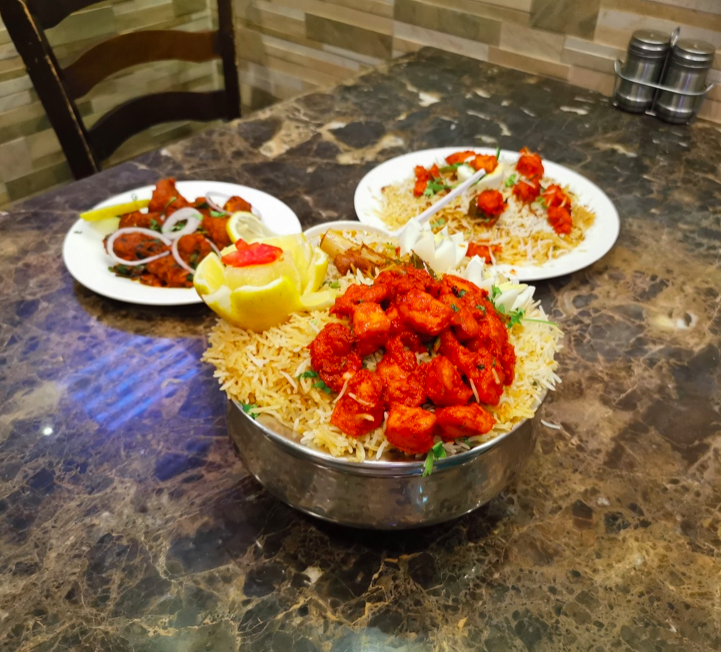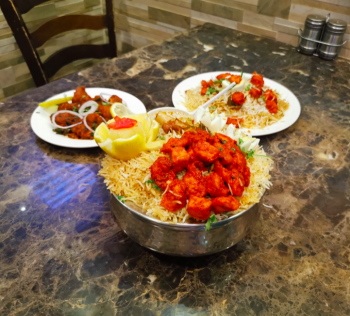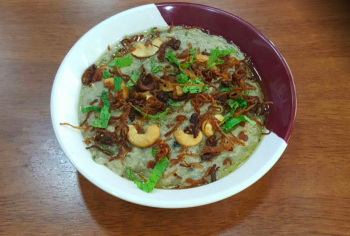Review about Hyderabadi'z Al Qasimia from Begum Monty
First time ordering here and it was a bad experience for me. Since it was recommended by my friend to try this restaurant so I considered it to try since it was new to me. However, it took 2 hours for me to wait and when it arrived the meat of the mutton was already soggy this was so disappointing the looks of the meat is unappetizing already. But taste still good just the looks and the time I've spent wait for my order.
Hyderabadi'z Al Qasimia
- Mon
- 12:00 PM - 11:30 PM
- Tue
- 12:00 PM - 11:30 PM
- Wed
- 12:00 PM - 11:30 PM
- Thu
- 12:00 PM - 11:30 PM
- Fri
- 01:30 PM - 11:30 PM
- Sat
- 12:00 PM - 11:30 PM
- Sun
- 12:00 PM - 11:30 PM
Services:
Restaurants / Café: Average bill 20 AED, Indian cuisine, Free delivery, Vegetarian menu, Desserts, Seating capacity 20 people; Payment methods: Cash payment, Cash on delivery; Assortment: Karak Tea; Service Language: English, Hindi, Arabic, Malayalam, Urdu.
Hyderabadi cuisine also known as Deccani cuisine of India, was developed after the foundation of Qutb shahidynasty by Sultan Quli, promoting the native cuisine along with their own. Hyderabadi cuisine had become a princely legacy of the Nizams ofHyderabad State. It is an amalgamation of Mughlai, Turkish and Arabic along with the influence of the native Telugu and Marathwada cuisines. Hyderabadi cuisine comprises a broad repertoire of rice, wheat and meat dishes and the skilled use of various spices, herbs and natural edibles.
The cuisine also contains city-specific specialities like Hyderabad(Hyderabadi biryani) and Aurangabad (Naan Qalia), Gulbarga (Tahari), and Bidar(Kalyani Biryani).
The cuisine emphasises the use of ingredients that are carefully chosen and cooked to the right degree and time. Utmost attention is given to picking the right kind of spices, meat, and rice. Therefore, an addition of a certain herb, spice, condiment, or a combination of these adds a distinct taste and aroma. The key flavours are of coconut, tamarind, peanuts and sesame seeds which are extensively used in many dishes. The key difference from the North Indian cuisine is the use of dry coconut and tamarind in its cuisine.
Traditional utensils made of copper, brass, and earthen pots are used for cooking. All types of cooking involve the direct use of fire. There is a saying in Hyderabad, cooking patiently (ithmenaan se) is the key; slow-cooking is the hallmark of Hyderabadi cuisine. The Slow-cooking method has its influence from the Dum Pukht method used in Awadhi cuisine.
Hyderabadi Cuisine has different recipes for different events, and hence is categorized accordingly, like banquet food, for weddings and parties, festival foods and travel foods. The category to which the recipe belongs itself speaks of different things like the time required to prepare the food, the shelf life of the prepared item, etc.
- +971 508043655
- +971 6 5303187
- Al Wazir, 10, Shujaa Bin Wahab Street, Al Nad, Al Qasimia, Al Qasimiah, Sharjah
If you find an error in the description, please let us know!




Comments on the review (0)